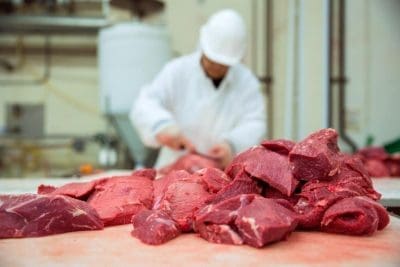IN a stark reflection of the tough trading conditions for beef processors last year, the Northern Cooperative Meat Co in northern NSW has announced an $11 million after-tax loss for its 2022-23 financial year, ended June 30.
The result – the worst in at least ten years – followed a $7.9 million loss the year before.
 The producer-owned cooperative held its annual general meeting in Casino earlier today.
The producer-owned cooperative held its annual general meeting in Casino earlier today.
By nature of its business structure and ownership, NCMC provides a valuable window into the financial state of health of Australian red meat processing.
Reflecting the return to larger processing numbers across the industry this year, volume through the plant for the year to June 30 was up around 10pc over the previous 12-month cycle – mostly accrued during the second half.
Two main factors contributed to the financial result – low throughput in the July-December period last year, and record high cattle prices.
Even though cattle prices started to soften in January this year, the full impact of price movement was not really seen until about April – too late to have a significant bearing on the latest financial year’s result. At the same time, global meat prices came off the boil significantly this year, further squeezing the financial performance.
While Casino remains a very significant service kill provider for eastern beef supply chains, the plant’s loss of market access to China in 2020 (along with several others, unexpectedly) saw a number of long-term service kill customers move elsewhere. That saw the plant lose around 1000 head per week – at a time when they could not be readily replaced with other business.
Move from service kill to internal programs
As a result of general lack of cattle numbers and the departure of some custom kill business, about 50-60pc of all cattle processed are owned by the cooperative itself – marketed and sold through Northern Rivers Meats. Ten or twelve years ago, the facility was 100pc dedicated to service kill operations.
The business worked hard to retail staff during the low production cycle – a decision which is now paying dividends, as processing activity starts to ramp up.
Despite that, the plant currently is operating at around 60pc of its beef capacity – entirely influenced by skills and labour access issues.
Supply chain cost pressures – everything from steel to maintenance inputs, and consumables – have gone up around 20-25pc over the past 12-18 months, shareholders were told.
Cooperative chairman John Seccombe said the financial result reflected the record cattle prices over the past year, peaking in December 2022.
Record re-stocking demand had increased the national beef herd to about 29 million, meaning pressure will be on cattle prices for the coming period, shareholders were warned.
“Since January 2023, reduced demand from re-stockers has resulted in the cattle price more than halving – improving profitability for processors after what has been the worst trading cycle in recent memory,” Mr Seccombe said.
With lower cattle prices and improving global beef demand, profitability for the processing sector is returning after three years.
Despite the $11 million reported loss, the co-op’s balance sheet remained strong, with cash deposits of $8.811 million after capital investment of $2.866 million during the 2022-23 financial year. There will be no dividend to shareholders this year.

Simon Stahl
Cooperative chief executive Simon Stahl said the decision to continue to engage excess workers throughout the year at levels above required was a deliberate strategy, meaning a larger skilled workforce was available when cattle were more readily available.
He said the co-op expects to lift cattle processing numbers this year by a further 30pc, subject to skilled labour access.
“Recruitment of local employees continues, however the PALM and skilled visa programs offer the best opportunity to build the workforce required,” Mr Stahl said.
Flood impact
The cooperative also owns and operates the Booyong export pork processing plant. Hit by major flooding back in February 2022.
Mr Stahl said the plant continued to get back on its feet.
“Our workforce at Booyong was completely decimated by the floods as people moved from the area, primarily due to the lack of housing,” he said.
“As a result of hard work and the PALM scheme, the pork operation is now performing well.”
With regard capital improvements at Booyong flagged last year, the AGM heard that the process had been delayed, but was now back on track with final DA approval expected before the end of this year.
Board changes
During elections held as part of the AGM, long-serving NCMC boardmember Neil Summerville retired, replaced by Lennard Blok, who returns to the board after a break. Damien Dougherty was also returned to the board, while John Seccombe remains board chairman.
Mr Seccombe paid tribute to Mr Summerville saying he had been an integral part of the board since 2012.
“I would like to publicly thank Neil for his input and commitment to the Co-operative and I wish he and wife Merle all the best,” he said.
